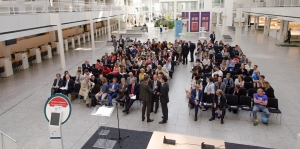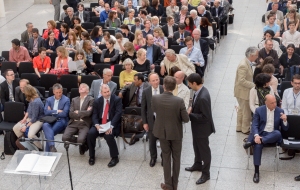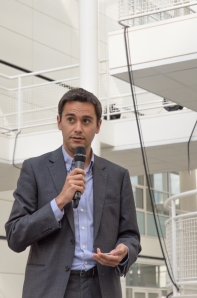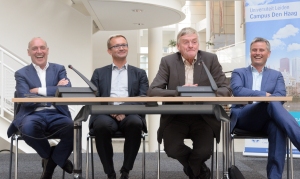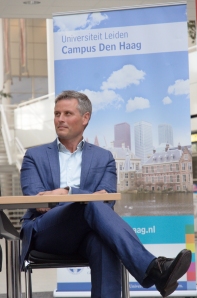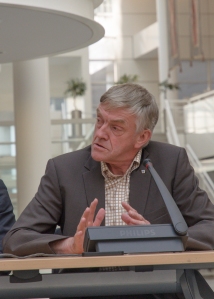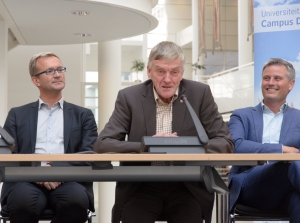De strijd tussen EU-landen is nu op zijn heetst, om de organisaties EMA en EBA binnen te hengelen. Net als veel bedrijven maken deze agentschappen deel uit van de ‘Brexodus’. Wat is de stand van zaken?
Meer dan twintig landen hebben een stad naar voren geschoven als nieuwe locatie voor de European Banking Authority (EBA) en het European Medicines Agency (EMA), beide gesitueerd aan de Canary Wharf in Londen. Amsterdam probeert het EMA binnen te halen en heeft als grote concurrenten Barcelona, Dublin, Kopenhagen en Milaan. Op 31 juli jl. verstreek de deadline om het zg. bidbook in te dienen. In oktober wordt er gestemd; tijdens de Algemene Vergadering in november 2017 valt de uiteindelijke beslissing voor beide locaties door de Europese Commissie.
De verhuizing van deze twee ‘parels van de EU’ betekent een aderlating voor het VK en een mogelijke schatkist voor de nieuwe gastheer. Bij het EMA en de EBA samen werken ruim 1000 experts, de agentschappen zijn goed voor 45.000 jaarlijkse bezoekers. Ze trekken ook bedrijven aan die graag in hun nabijheid komen werken. Op de website van de Europese Raad (ER) is te zien welke landen kandidaat zijn en hoe zij zich presenteren, zowel schriftelijk, visueel (website) als op video. Bijna alle EU-landen meldden zich aanvankelijk als kandidaat, maar uiteindelijk strijden uiteindelijk 19 landen voor het EMA en acht voor de EBA (daar zit Nederland niet bij).
Het filmpje voor Nederland doet soms denken aan een Arjen Lubach parodie. Het filmpje begint met: “After all, we’re not that different: We also have a very stylish queen and we enjoy fish and chips” (beeld van een man die een haring naar binnen hapt). Vervolgens worden de vele Internationale Organisaties in Den Haag genoemd en de al aanwezige Europese medicijnenwaakhond College ter Beoordeling van Geneesmiddelen (CBG). De plek waar het gebouw voor EMA moet komen wordt geshowd (de Zuid-As), de afstand tot Schiphol (tien minuten) en nieuwkomers wordt beloofd dat zij individuele coaching krijgen om te aarden in Amsterdam. Dan eindigt het met “The Dutch are open-minded folk, with a lively international capital to prove it” (plaatje van Koningsdagvierders). Over de film heen verschijnen vier C’s maar in de tekst wordt daar niet over gerept. In de filmpjes van andere landen komen wat minder volksgewoontes en meer steekhoudende argumenten naar voren, geuit door experts uit de medische wereld. Dublin stelt drie mogelijke locaties voor, in Kopenhagen is het gebouw al gehuurd en kan het EMA er zo in, Stockholm noemt zijn medische ‘hub’. Veel landen hebben gekozen voor een persoonlijke aanpak door expats aan het woord te laten die er al wonen.
Hoeveel moeite hebben de kandidaten tot nu toe gedaan voor EMA? Nederland, Ierland en Denemarken organiseerden events in Brussel om hun bids te presenteren. De meeste Oost-Europese landen bleven nog even stil, om hun lobbykrachten pas later in het proces te laten gelden. Vijf van de 23 geïnteresseerde landen hadden geen tijd om het agentschap te bezoeken. Van de landen die dat wel deden, klopte Hongarije als eerste aan de deur. Sommige landen hebben zelfs méér dan eens het agentschap bezocht, waaronder Oostenrijk (drie keer) Denemarken en Frankrijk (beide twee keer). Ministers van gezondheid van Spanje, Frankrijk, Ierland, Malta, Portugal, Romenië en Zweden zijn allemaal langs geweest. Andere landen hebben plaatsvervangers gestuurd. Vrijwel alle gasten lieten flyers achter om EMA-personeel te overtuigen dat hún land het meest geschikt was.
Onder de selectiecriteria voor een nieuwe vestigingslocatie, zoals bereikbaarheid, de continuïteit van het werk van de agentschappen, internationale scholen, goed geschoold personeel, voldoende woningen, mogelijkheden om te werken voor partners, hotelcapaciteit voor de jaarlijkse bezoekers en een gezondheidscluster, valt ook het doel om agentschappen gelijkelijk over Europa te verdelen. Dit is in december 2003 door alle lidstaten afgesproken en in 2008 nog eens bevestigd.
De Commissie heeft die verdeling echter lager op de ranglijst gezet, met het argument dat deze regel vooral geldt voor locaties van nieuwe agentschappen. Wel dienen de lidstaten rekening te houden met de geest van deze regeling. Dat de organisaties door kunnen gaan met business as usual en verhuizen naar een liefst centraal gelegen stad zijn hoger op de prioriteitenlijst komen te staan. Deze keuzes verkleinen de kansen voor Oost-Europese kandidaten, waar tot nu toe de agentschappen dun bezaaid zijn. Een andere factor van belang is de bijkomende hoge kosten van de verplichte overname van het Londense huurcontract (à 3 miljoen, tot 2037) en opslagruimte voor het gehele archief van EMA. Veel opslagruimte. Het nieuwe gebouw moet uiteraard direct te betrekken zijn op het moment van verhuizen in 2019.
Na veel discussie is besloten dat in oktober wordt gestemd in drie rondes. Eerst wordt de locatie van het EMA afgekaart, dan de EBA. Dit moet de schijn van belangenverstrengeling tegengaan, beide organisaties mogen niet in dezelfde stad komen en het is de bedoeling ze als twee aparte processen te benaderen. Omdat zoveel landen meedoen, is afgesproken dat elke lidstaat zes stempunten heeft, waarvan drie naar de eerste keus gaan, twee naar de tweede en één naar de derde keus. Als een van de landen drie punten ontvangt van minstens 14 landen, dan heeft dit land gewonnen. Zo niet, dan gaan de drie landen met het hoogste aantal punten door naar de tweede stemronde. In die ronde heeft elke lidstaat nog maar 1 stem, voor een van de overgebleven kandidaten. Als een voorstel de meerderheid van de stemmen krijgt, is deze de winnaar. Zo niet, dan is er een derde ronde met wederom één stem per land. Degene met de meeste stemmen wordt de gastheer voor EMA; vervolgens zal hetzelfde proces plaatsvinden voor de EBA.
Hoewel de EBA en EMA als twee verschillende gevallen behandeld moeten worden, zal steunruil waarschijnlijk wel plaatsvinden. Er gaan verschillende geruchten rond. Frankrijk zou aan Duitsland voorgesteld hebben om Frankfurt de EBA te laten winnen, als het EMA in Lille terecht zou komen. Een ander verhaal gaat dat de Fransen hun steun zouden uitspreken voor Frankfurt als een Oost-Europees land voor het EMA in aanmerking zou komen, in ruil voor het financieel versterken van een bestaand Frans agentschap, ESMA. Duitsland zou alleen maar op beide agentschappen inzetten in de hoop dat het in ieder geval de EBA binnenhaalt, Hongarije en Polen doen dat ook, maar laten niet weten welke ze prefereren. Ondertussen wordt door de Oost-Europeanen achter de schermen gelobbyd om voorrang te krijgen op landen die al een agentschap huisvesten. Bulgarije, Polen, Roemenië, Hongarije en Kroatië zijn succesvol in lobbyen achter gesloten deuren, zo heeft de procedure van CEPOL de vorige keer laten zien (in 2014, waarbij het Oost-Europese blok een patstelling veroorzaakten zodat alleen nog maar op Hongarije gestemd kon worden).
Amsterdam en Den Haag hebben momenteel niet genoeg capaciteit op de internationale scholen voor de ruim 600 kinderen van de nieuwe EMA-werknemers; Amsterdam heeft bovendien te weinig woningen. Het EMA-gebouw op de Zuid-As is nog niet klaar. Hoewel de overheid 11 miljoen heeft toegezegd voor huisvesting en internationale scholen, is dit misschien niet overtuigend genoeg. Verder heeft Nederland toegezegd alle families persoonlijk te helpen met integreren, andere landen doen dit ook. En, als het gebouw eind maart 2019 nog niet klaar is, dan is er een transitiegebouw, aldus locoburgemeester Kajsa Ollongren. Nederland heeft 8 miljoen gereserveerd voor de training van medewerkers uit andere EU-landen om bij EMA te kunnen werken en zegt 2 miljoen in zijn eigen medische agentschap CGB te zullen steken. Minister Schippers heeft in juni het Nederlandse bid mogen presenteren, samen met VUmc bestuursvoorzitter Wouter Bos.
Welke steden zullen het worden? Houden de lidstaten rekening met de afspraak voorrang te geven aan een land dat nog geen agentschappen heeft, of juist met een centraal gelegen stad die makkelijk bereikbaar is en waar de transitie soepel zal verlopen? Het zal afhangen van de lobby en hoeveel steunruil er plaatsvindt. De landen met het meeste ‘wisselgeld’ en de slimste onderhandelaars met de juiste vrienden zullen uiteindelijk de gastheer worden.
Epiloog: Amsterdam heeft goed gelobbyd; op 20 november is het fel begeerde EMA daar binnengehaald. Hoe verliep de finale?
Allereerst zijn er drie blokken ontstaan tijdens de lobby voor het Europees Medicijnen Agentschap EMA. Het Oost-Europese blok schaarde zich achter de Slowaakse hoofdstad Bratislava. Een Zuid-Europese lobby ontstond voor Milaan (die stemmen ontving van Griekenland, Malta, Roemenië en Cyprus). Daarom leek het moeilijk voor Amsterdam, met als grote concurrent Kopenhagen, om steun te verzamelen.
Wouter Bos reisde onvermoeibaar Europa rond om bijvoorbeeld Oost-Europese landen te beloven in de toekomst belangrijke medische kennis te delen in ruil voor hun stem op Amsterdam. Doordat Malta op het laatste moment afhaakte en daarop volgend ook Kroatië en Ierland, waren er nog maar zestien landen in de race op 20 november 2017. Spannend, want deze landen stemden wel mee, maar hun zes stemmen in de eerste ronde gingen niet meer naar hun eigen stad.
In de tweede stemronde bleven Milaan met 25 stemmen, en Kopenhagen en Amsterdam met elk 20 stemmen over. Bratislava (15 stemmen) en Barcelona (12 stemmen) vielen net buiten de top drie. In de volgende ronde kwamen vervolgens Milaan (12 stemmen) en Amsterdam (9 stemmen). In de laatste ronde werd het pas echt spannend: gelijkspel. Beide steden kregen 13 stemmen, één van de EU-landen heeft zich onthouden van stemming. Er zijn lootjes getrokken. Amsterdam kwam als winnaar uit de bus. De troostprijs, het Europese Banken Agentschap EBA, ging naar Parijs. Dit tot groot verdriet van Frankfurt en het in crisis verkerende Duitsland.
Ruim tachtig procent van het EMA-personeel heeft aangegeven naar Amsterdam te willen verhuizen. Het tijdpad is strak: op 30 maart 2019 moet de transitie voltooid zijn. De grote uitdaging van nu is het gebouw op tijd optrekken op de Zuid-As en de Internationale en Europese scholen uitbreiden, voordat er 300 kinderen bij komen.


